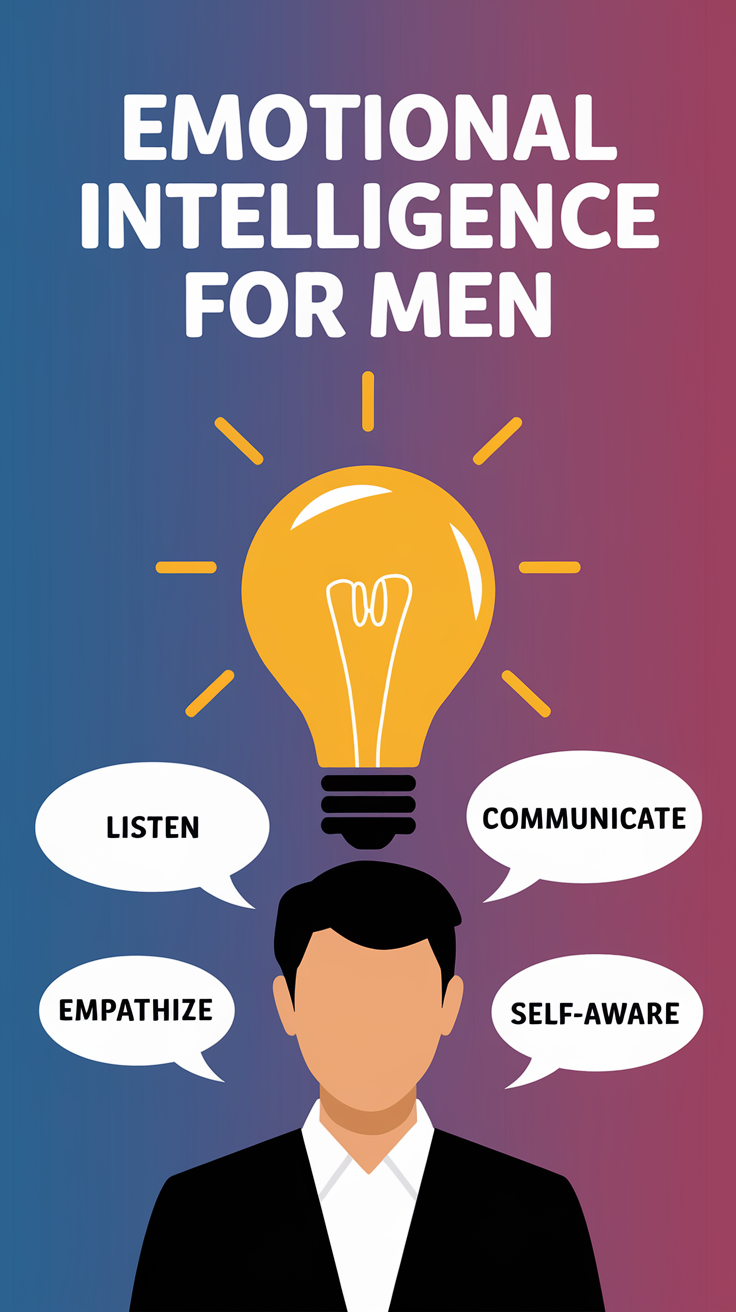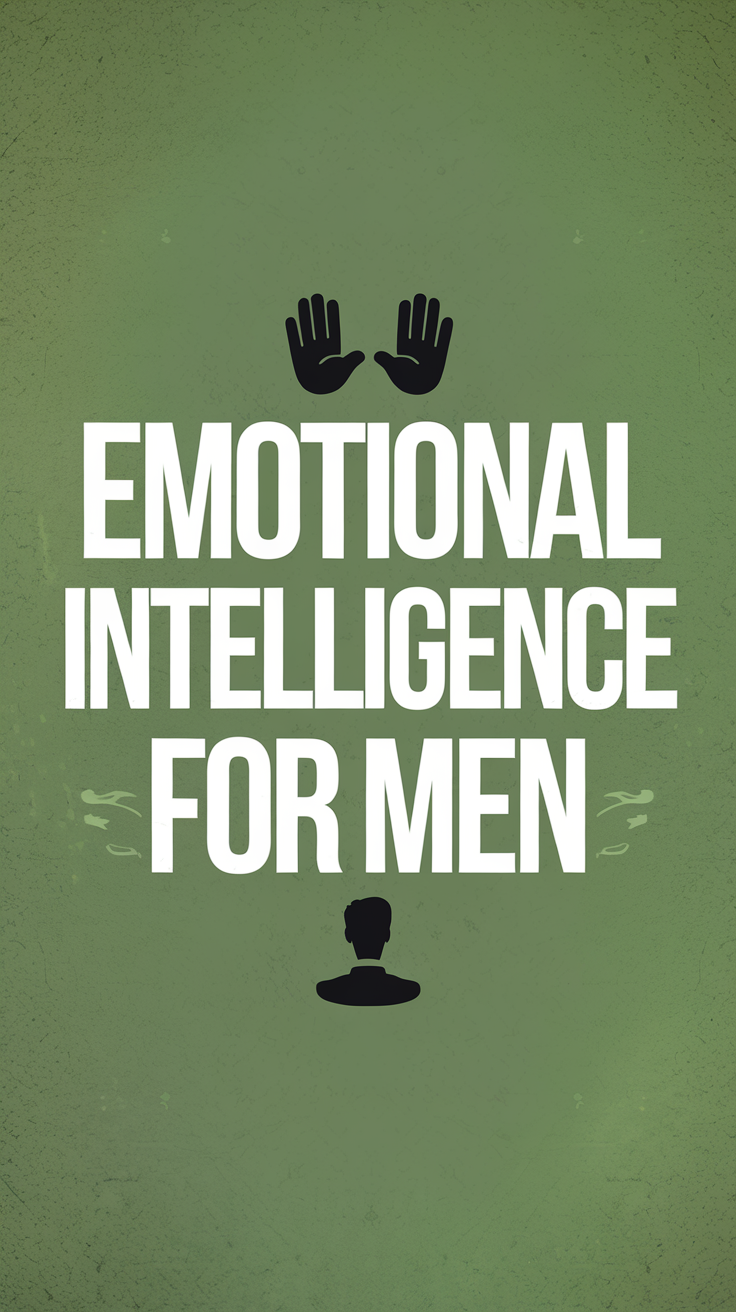Emotional Intelligence for Men: A Complete Guide
Emotional intelligence (EI) has changed my life, and it can change yours too. For too long, men have been conditioned to bottle up their emotions, only to see relationships crumble and stress build up. But what if I told you there’s a better way? Emotional intelligence for men is about mastering your emotions—not suppressing them. It’s the key to improving your mental health, building stronger connections, and advancing in your career. Let’s dive into what EI is, why it matters, and how you can start improving it today.
What is Emotional Intelligence?
At its core, emotional intelligence is the ability to recognize, understand, and manage emotions—both your own and those of others. Psychologist Daniel Goleman breaks emotional intelligence into five critical components:

| Component of EI | Description |
|---|---|
| Self-Awareness | Understanding your emotions and their impact. |
| Self-Regulation | Managing emotional responses effectively. |
| Motivation | Channeling emotions to stay focused on goals. |
| Empathy | Recognizing and sharing others’ emotions. |
| Social Skills | Building and maintaining relationships. |
Why it matters: These components work together to help men lead more balanced, fulfilling lives.
Why Emotional Intelligence Matters for Men
1. Stronger Relationships
Men often struggle to communicate emotions, leading to misunderstandings and conflict. With emotional intelligence:
- You can express feelings clearly without anger or blame.
- You build trust and deeper emotional connections.
- You learn to resolve conflicts with calm, constructive solutions.
2. Greater Career Success
In professional settings, emotional intelligence can separate good leaders from great ones. Benefits include:
- Better teamwork: Understanding colleagues’ perspectives reduces tension.
- Improved leadership: Motivating teams through empathy fosters success.
- Higher earning potential: Studies show emotionally intelligent individuals earn up to 20% more annually.
3. Mental Health and Stress Management
Men often face immense pressure to appear strong. EI helps manage stress by:
- Improving emotional regulation to stay calm under pressure.
- Reducing burnout through healthier coping mechanisms.
| Benefit | How It Helps |
|---|---|
| Improved Relationships | Builds trust and enhances communication. |
| Career Success | Strengthens leadership and teamwork. |
| Better Mental Health | Reduces stress and promotes resilience. |
| Effective Conflict Resolution | Helps resolve disagreements calmly. |

Practical Strategies to Develop Emotional Intelligence
1. Increase Self-Awareness
To understand your emotions, try these exercises:
- Journaling: Reflect daily on your emotions and their triggers.
- Mindfulness Meditation: Observe your feelings without judgment.
Example: Write about a moment when anger clouded your judgment. How could you have responded differently?
2. Cultivate Empathy
Empathy builds stronger relationships. Here’s how you can practice it:
- Listen Actively: Focus on the speaker without interrupting.
- Ask Questions: Show interest with questions like, “How did that make you feel?”
- Perspective-Taking: Imagine yourself in someone else’s shoes.
3. Regulate Your Emotions
Emotional control prevents impulsive reactions. Use these techniques:
- Box Breathing: Inhale, hold, exhale, and pause for 4 counts each.
- Physical Activity: Exercise reduces stress hormones like cortisol.

Overcoming Emotional Barriers for Men
Society often teaches men that showing emotions is a weakness. Let me say this: embracing your feelings is not weak—it’s powerful. Here’s how to redefine emotional strength:
- Challenge the stereotype that men shouldn’t express emotions.
- Join supportive groups where men discuss mental health and EI openly.
- Start small: Share feelings with trusted friends or partners.
Real-Life Example of Emotional Intelligence
Picture this: You’re a manager, and your team misses an important deadline. Instead of snapping, you:
- Regulate your frustration and approach the situation calmly.
- Empathize with your team to understand what went wrong.
- Collaborate to fix the problem and prevent it in the future.
This is emotional intelligence in action—leading with understanding, not anger.
Conclusion
Emotional intelligence for men isn’t just a buzzword—it’s a life skill that transforms relationships, careers, and mental health. Start by practicing self-awareness, empathy, and emotional regulation. The journey may feel challenging, but the rewards are worth it. Begin today, and watch your life change for the better.
FAQs
1. What is emotional intelligence?
It’s the ability to understand, manage, and use emotions effectively in yourself and others.
2. Why is emotional intelligence important for men?
It helps men improve relationships, succeed professionally, and manage stress.
3. How can I develop emotional intelligence?
Start with journaling, active listening, and emotional regulation techniques like breathing exercises.
4. Is showing emotions a sign of weakness?
No, emotional intelligence reflects strength, maturity, and confidence.
5. How does emotional intelligence improve mental health?
It reduces stress, improves emotional resilience, and encourages healthier coping strategies.






